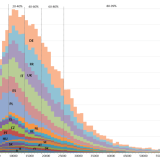
Toimivat ja osallistavat työmarkkinat
Finanssikriisistä toipuvassa taloudessa piilevä työpaikkojen syntymispotentiaali saadaan hyödynnettyä täysimittaisesti vain, jos työmarkkinat toimivat moitteetta. Kriisillä on ollut hyvin erilaisia vaikutuksia työmarkkinoihin eri EU-maissa, ja vaikutukset ovat kohdistuneet erityisen ankarasti joihinkin ryhmiin, kuten nuoriin ja vähän koulutettuihin. Myös meneillään oleva nopea rakennemuutos aiheuttaa uusia haasteita, kun ammattitaitoisen työvoiman kysyntä ja tarjonta eivät kohtaa eri aloilla ja alueilla.
EU:n tärkein työllisyyden ja sosiaalisen osallisuuden edistämisen työkalu on Euroopan sosiaalirahasto, jolla autetaan ihmisiä löytämään töitä, integroidaan epäedullisessa asemassa olevia henkilöitä yhteiskuntaan ja varmistetaan kaikille tasapuolisemmat mahdollisuudet elämässä. Myös monissa EU:n säädöksissä säädetään työntekijöiden oikeuksista työelämässä. Euroopan komissio käynnisti lisäksi huhtikuussa 2017 Euroopan sosiaalisten oikeuksien pilaria koskevan hankkeen. Pilari perustuu EU:n sosiaali- ja työllisyyspolitiikalle ja täydentää sitä. Se ohjaa toimenpiteitä eri aloilla, jotka ovat olennaisia toimivien ja oikeudenmukaisten työmarkkinoiden ja sosiaalihuoltojärjestelmin kannalta.
- Euroopan komissio: Euroopan sosiaalirahasto
- Euroopan komissio: Euroopan sosiaalisten oikeuksien pilari




























